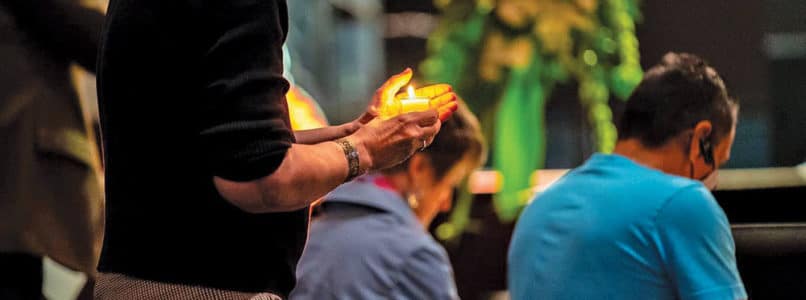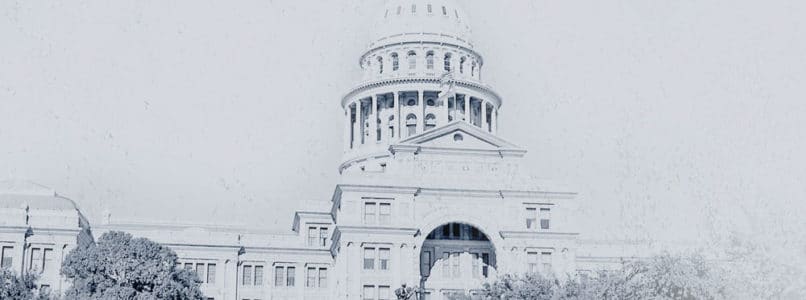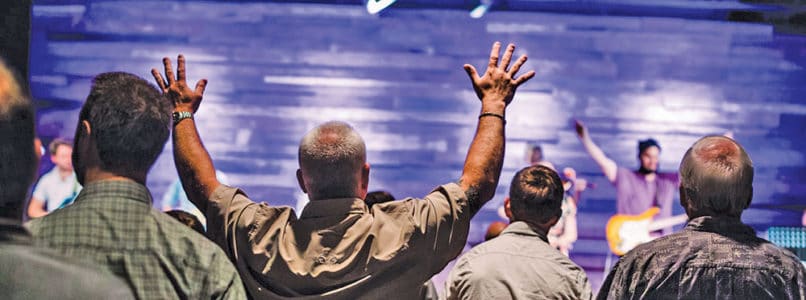NASHVILLE (BP) – Presidents of the six Southern Baptist seminaries gave reports to messengers and guests attending the 2021 SBC Annual Meeting Wednesday (June 16). A common theme of the reports was God’s faithfulness during the challenges of 2020. Below are summaries of each report submitted by the seminaries.
IORG: Gateway reflects kingdom diversity; celebrates milestone
By Tyler Sanders
Gateway Seminary’s mission is exemplified in biblical diversity and by a significant graduation milestone, President Jeff Iorg told messengers. “Gateway is your daily demonstration of the power of the Gospel to unify people from a wide variety of cultural and racial perspectives,” he said.
Photo by Karen McCutcheon
Iorg said in the past semester the seminary offered master’s level courses in English, Korean and Mandarin, and diploma training at its learning centers in English, Korean, Spanish, Burmese, Cantonese, Chin, Thai, Lao, Karen, Main, Nepalese, French, Haitian-Creole, Hmong, Vietnamese and Mongolian. Anglo students have made up less than 50 percent of Gateway’s student body for more than 25 years.
“We have current employees who are African American, Mexican, Romanian, Chinese, Korean, Pacific Islander, Filipino, Australian, Zambian, Taiwanese and Anglo,” Iorg said.
“Because of this diversity, Gateway has been addressing racial issues and the global problem of racism for decades.”
Iorg said Gateway faculty depend on biblical, theological and missiological tools to train students to confront racism. He told messengers that following his April report to Gateway trustees, a trustee asked if the seminary could produce a document detailing how faculty address racism in the classroom.
“Our faculty responded to this request with pages of examples of how they address racism and racial issues throughout the curriculum – from biblical studies to theology to church history to counseling to spiritual formation to early childhood development and every discipline in between,” Iorg said. The document is available at gs.edu/curriculum.
Iorg shared a personal story, relating his invitation to serve as the first Anglo elder of a historic African American church, Mt. Zion Baptist Church in Ontario, Calif.
“My relationships with the leaders at Mt. Zion have become a profound source of spiritual strength for me,” he said.
“For the past six years, we have been tithing our income, helping start a second site, going to prayer meetings, and giving to the building program. Ann teaches Sunday School, and I preach a few times each year.
“It has been a life-changing experience to build leadership credibility in a church where we are learning new ways of being the church as white minority members within a majority black culture.”
Iorg asked messengers to share in celebrating Gateway’s 10,000th graduate, Yoon Sagong. Sagong earned the master of divinity and serves as a pastoral intern alongside a Gateway faculty member in a southern California church plant.
“Some of you may be surprised [by 10,000 graduates] because you think of Gateway Seminary as your small seminary out West. We are now a leader-producing powerhouse making a global impact,” he said.
“We thank you Southern Baptists for standing with us, giving through the Cooperative Program, praying for us and sending us students.”
Allen emphasizes MBTS’ commitment to local churches
By Michael S. Brooks
Midwestern Baptist Theological Seminary President Jason Allen’s report to the messengers at the 2021 SBC Annual Meeting reflected the institution’s ongoing determination to serve the local church.
Photo by Karen McCutcheon
Citing God’s faithfulness to the seminary over the past year, Allen noted that Midwestern Seminary is standing strong, remaining faithful and enjoying continued growth.
“I am delighted to report that our Convention’s youngest seminary is standing strong, serving faithfully, and, once again, enjoying another year of record enrollment,” Allen said. “Our ambition is to be undeniably faithful when it comes to serving the local church. In sharper focus, our desire is to serve Southern Baptist churches faithfully.
“We are not here to lecture to you; we are here to hear from you. We are not here for you to serve us; we are here so we can serve you. That is a precious stewardship that we enjoy. We are for the church and will continue to persist in that vision on your behalf.”
Alongside the seminary’s sustained efforts to serve Southern Baptist churches, Allen pointed to the institution’s theological convictions as an additional reason for the seminary’s progress.
“We are proudly, wholeheartedly, and unreservedly a Southern Baptist institution,” Allen said. “We hold to the Baptist Faith and Message, the Danvers Statement on Biblical Manhood and Womanhood, the Nashville Statement on Marriage, Gender, and Sexuality, and the Chicago Statement on Biblical Inerrancy, all with full confidence and conviction.”
Allen further suggested it is necessary for Midwestern Seminary to do more than merely affirm the collection of doctrinal statements, saying, “It is also our role to defend and advocate for these statements.”
“What is more, we refuse to be forced into false binaries,” he continued. “We can be and are cheerfully, convictionally, and confidently complementarian while, all the while, honoring and protecting our sisters as joint heirs in Christ. We can clearly and confidently reject secular ideologies and critical theories, such as Critical Race Theory, that have a negative impact while, all the while, being intentional to bear the burdens of our African American brothers and sisters. We can bring them into our midst, serve and grow with them, and honor them as brothers and sisters in Christ.”
Regarding enrollment, Allen credited God’s kindness and the resolve of the seminary community as contributing factors in the seminary’s continued growth. He announced the past year’s total student headcount was 4,374, more than four times the number of students enrolled at MBTS 10 years ago. In addition, the total number of full-time enrolled students for the past year was 1,615, an increase from just over 400 students 10 years ago.
Allen closed his address by thanking messengers for their continued prayers and support, saying, “This is your seminary: Midwestern Baptist Theological Seminary, founded in 1957. If you know much of the history of the past 60 years, you know it took a while for this institution to hit its stride. But, by God’s grace and with your support, we are pursuing and growing in greater faithfulness to the great truths we hold. And we are doing so, I believe, in ways that make Southern Baptists proud.”
Dew: NOBTS to prioritize servanthood, devotion, Gospel proclamation and missions
By Gary D. Myers
In his report to the messengers of the Southern Baptist Convention, New Orleans Baptist Theological Seminary and Leavell College President Jamie Dew expressed hope for the future of the SBC and excitement about what is happening in New Orleans. Dew also pledged to prioritize servanthood, devotion, Gospel proclamation and missions at NOBTS.
Photo by Karen McCutcheon
Due to the COVID-19-related cancellation of the 2020 annual meeting, Dew’s Wednesday (June 16) address marked his first opportunity to present the seminary report to SBC messengers since his 2019 election.
“When I went down to New Orleans and moved our family there, I discovered all sorts of beautiful and wonderful things about this calling,” Dew said. “It is a life of deep joy and great meaning in doing this work for you and for the kingdom.”
Dew commended the students and faculty at New Orleans Seminary and Leavell College for their humility and the way they serve Southern Baptists. He said it has been a joy to do the work God has called him to, and the convention has entrusted to him with the NOBTS team.
While acknowledging the problems and difficulties in New Orleans, Dew sought to reframe the way believers think about the city. Dew sees real beauty and Gospel opportunities in New Orleans.
“We believe that New Orleans is the perfect laboratory for men and women to come to prepare for ministry,” Dew said. “In short, if you can do ministry in our city, then you can do ministry anywhere that God puts you.”
“That’s why we say, ‘Prepare Here. Serve Anywhere,’” Dew said.
Next, Dew shared hopeful words regarding the Southern Baptist Convention. Social media can give a skewed perception of Southern Baptists and cause despair, he said. However, spending time with faithful Southern Baptist pastors and visiting churches across the country has given Dew a truer picture of the SBC and given him reasons for optimism.
“At the end of the day, Southern Baptists are faithful people. They are humble people. They are servant people,” Dew said. “They just love Jesus and want to win the world for Christ.”
“Despite what other problems we have. Despite what other difficulties we may face, I have hope. I see your work, and I am honored to join with you.”
When Dew began serving NOBTS, he took time to listen and learn about the school and understand the city of New Orleans. After this time of reflection and discovery, Dew and his leadership team drafted a new mission statement for the school extolling servanthood, devotion, proclamation and missions. The statement, “New Orleans Baptist Theological Seminary and Leavell College prepares servants to walk with Christ, proclaim His Truth, and fulfill His mission,” became the blueprint for every class, program and initiative at NOBTS.
“Brothers and sisters, if we are anything as Christians, we are supposed to be servants,” Dew said. “We are supposed to be people who take up the towel and basin and serve not just each other but the broken of this world and there in the darkest places, shine the light of Jesus.”
Devotion is essential for any Christian Dew said. He said the faculty seeks to shape students spiritually to become who God has called them to be.
NOBTS has long been known for training preachers and evangelists, Dew said. Proclamation of the gospel remains a top priority for the school.
“In the last year, our students shared the gospel 11,313 times. They have led 1,087 people to faith in Christ,” he said. “Since 2014, students and faculty have shared the gospel 94,190 times, that we know of, and they have led 9,203 people to faith in Jesus Christ. We have been, and we are a school of proclamation.”
NOBTS and Leavell College are reprioritizing missions to meet the needs identified by the two SBC mission boards.
“Paul Chitwood reminds us that there are 155,000 people who die every day without Christ and that they need 500 new missionaries every year to do their work,” Dew said. “Kevin Ezell said we need to plan 1,200 new churches each year.”
To help with these tasks, Dew appointed missiologist Greg Mathias to the NOBTS faculty and relaunched the school’s Global Missions Center to help train missionaries for service with the International Mission Board. NOBTS also partnered with the North American Mission Board to start a new church planting center on the NOBTS campus.
“It is time for NOBTS to stand up and give back to you and to the kingdom the very best that we can,” Dew said.
SEBTS continues to fulfill the mission, Akin reports to messengers
By Lauren Pratt
During his report to Southern Baptist messengers and guests June 16, Southeastern Baptist Theological Seminary (SEBTS) President Danny Akin celebrated the many avenues by which students are training to fulfill the mission around the world. Akin highlighted how this is happening through training the school’s nearly 6,000 students, through Global Theological Initiatives and through the North Carolina Field Minister Program.
Photo by Karen McCutcheon
“When we say at Southeastern, ‘every classroom a Great Commission classroom,’ and ‘every professor a Great Commission professor,’ that is not a slogan. That is who we are.”
Akin also celebrated the Global Theological Initiatives (GTI) at SEBTS, which works with strategic partners on six continents to create cohorts of selected, positioned leaders from their seminaries, mission boards, denominations and key churches. GTI’s goal is to equip these national leaders so that they will train the local pastors and missionaries from within their various contexts. GTI is currently equipping more than 2,800 vetted, positioned leaders in more than 30 nations and global cities. This is done through partnership with educational and missions entities in these countries and by locking arms with these global leaders in helping to develop curriculum, organizational strategies and more.
“We’re training leaders in these various countries to disciple and to raise up more leaders within their particular people group,” Akin said, adding that SEBTS is continuing to train Farsi-speaking believers through its Persian Leadership Initiative by offering a Bachelor of Science in pastoral ministry, the only such program offered in the world.
Also highlighted in Akin’s report to messengers was The North Carolina Field Minister Program, which trains incarcerated men to fulfill the Great Commission even behind prison walls. In December of this year, the program will be celebrating its first graduating class of 26 students. The program, which began in 2017, was launched in partnership with the North Carolina Department of Public Safety, Joe Gibbs Racing and Game Plan for Life. The program is designed for incarcerated men with a sentence of 12 or more years in the North Carolina prison system. These men are equipped with a four-year bachelor’s degree in pastoral ministry that allows them to bring the Gospel and fulfill the mission in a highly inaccessible context.
Akin celebrated the continual growth of Southeastern’s ever-growing student population, which has surpassed 5,800 students. The Master of Divinity still proves to be the seminary’s flagship degree.
In all of the degree programs offered at SEBTS, the desire is to see every graduate come away loving God, the truth, the Church and the world more deeply, Akin said. These four loves are what compel a Great Commission lifestyle no matter the cost, and these are the kind of students SEBTS seeks to train and send out for the glory of King Jesus.
“All of this is being done because of your generosity, your kindness, and your gifts,” Akin told messengers.
Southern emerges from pandemic stronger than before, Mohler says
Photo by Karen McCutcheon
In his report to the Southern Baptist Convention annual meeting Wednesday morning (June 16), Southern Baptist Theological Seminary President Albert Mohler told messengers the seminary had withstood the challenges which the pandemic posed and had come out on the other side in a healthier state than before it began.
“We have more young men at SBTS training to be preachers and pastors than at any time in SBC history and more M.Div. students than at any other time in Christian history,” Mohler said. “During the trial of COVID-19, we had a higher enrollment than when it began. We expect to have more than 70 different nations represented on the SBTS campus when we begin fall semester later this year.
“We are told that in heaven there is great rejoicing over one sinner who repents, so just imagine the rejoicing in heaven amongst those who have gone before us to see what the Lord has done in our time and in our midst and what He will do in the future.”
Greenway addresses CRT query, explains college name change
By Art Toalston
A messenger’s question about critical race theory during the Southwestern Baptist Theological Seminary report to the Southern Baptist Convention June 16 led President Adam W. Greenway to explain the theory’s incompatibility with the Baptist Faith and Message, while also apologizing to African American believers who have been offended by the Council of Seminary Presidents’ statement about the controversial subject.
Photo by Karen McCutcheon
“For any way in which I personally have hurt you, I apologize, and I ask you to forgive me,” he said. “That is not my heart, that is not our heart at Southwestern Seminary.”
Before addressing the question, Greenway announced that Texas Baptist College is the new name of the seminary’s undergraduate school and noted Southwestern Seminary became majority non-Anglo in enrollment last year for the first time since its founding in 1908.
“I am thankful to serve as president of a seminary that the Lord is bringing back to new life,” Greenway said, quoting the “Amazing Grace” stanza with the words, “Through many dangers, toils and snares we have already come.”
With Texas Baptist College replacing the name of Scarborough College (named for Southwestern’s revered second president, L.R. Scarborough), Greenway said people have asked, “What’s the real reason you did that?” thinking there was “some nefarious political scheme involved by this group or that group.”
A primary reason, he noted, stemmed from being weary “of hearing from people who’ve said, ‘I searched Google for Baptist colleges in Texas, and I can’t find yours.’
The new name of Texas Baptist College denotes “a distinctive, Scripture-driven, Christ-centered, student-focused undergraduate education,” Greenway said. “When others run away from our Baptist identity and distinctives, we’re going to run toward and embrace these things because we believe being Baptist means something valuable.”
The question-and-answer time for Greenway’s report to the SBC moved to critical race theory after a first-time messenger, Conner Smith, senior pastor of Temple Baptist Church in Perris, Calif., said he was discouraged by the lack of resources for “defining these ideologies for pastors to help us pastor our people through some of those questions.” Smith asked whether the seminaries or a task force could provide help.
Greenway recounted that a statement by the SBC’s six seminary presidents in November 2020 was “something that at a bare minimum we felt like we needed to say, but it is not all that all of us could say” about the issue.
He read from Article 15 in the Baptist Faith and Message on the Christian and the Social Order: “All Christians are under obligation to seek to make the will of Christ supreme in our own lives and in human society. Means and methods used for the improvement of society and the establishment of righteousness among men can be truly and permanently helpful only when they are rooted in the regeneration of the individual by the saving grace of God in Jesus Christ.”
Emphasizing the second sentence, Greenway said, “Critical race theory as an academic, philosophical theory rejects that claim,” noting that a book on the sufficiency of Scripture by Southwestern Seminary faculty members will be published next year by the school’s Seminary Hill Press to help examine a key facet of Christian response to such theories.
“However, many of our African American brothers and sisters, when they hear critical race theory, what they hear and what they heard from us [as seminary presidents] was that we were denying the reality of structural or systemic racism,” he continued.
“And I want to say not only as president of Southwestern Seminary but as a pastor at heart … it breaks my heart that anything that we could have done as a [Council of Seminary Presidents] could in any way hurt or alienate or estrange our African American brothers and sisters in Christ.
“I will say publicly: For any way in which I personally have hurt you, I apologize and I ask you to forgive me. That is not my heart, that is not our heart at Southwestern Seminary.”
Earlier in his report, Greenway had described Southwestern Seminary as “committed unreservedly, unswervingly to the inerrancy, infallibility, inspiration, authority, sufficiency, indestructibility, indescribability” of Scripture. “Our confidence is in the Bible as the written Word of God. And it is the primary textbook in every classroom at Southwestern Seminary.
“We are a confessional seminary,” he continued.
The faculty’s adherence to the Baptist Faith and Message, the Chicago Statement on Biblical Inerrancy, the Danvers Statement on Biblical Manhood and Womanhood and the Nashville Statement on Gender and Sexuality make clear that “Southwestern Seminary is committed to upholding the faith once and for all delivered unto the saints,” Greenway said.
“With confidence and conviction, you can be assured that your Cooperative Program dollars are going to invest in a theological education that echoes the heartbeat of our Southern Baptist Convention of churches.”








